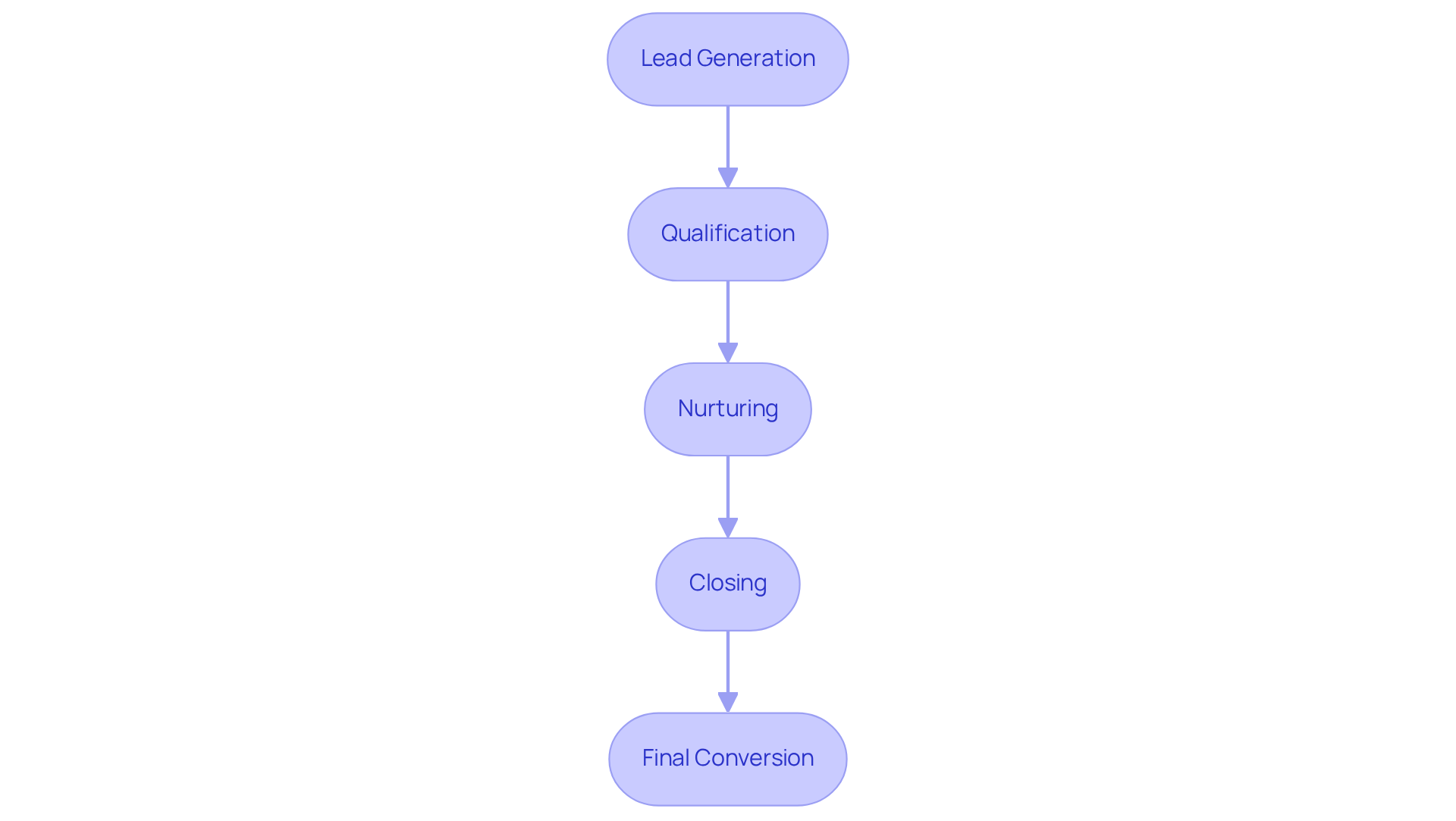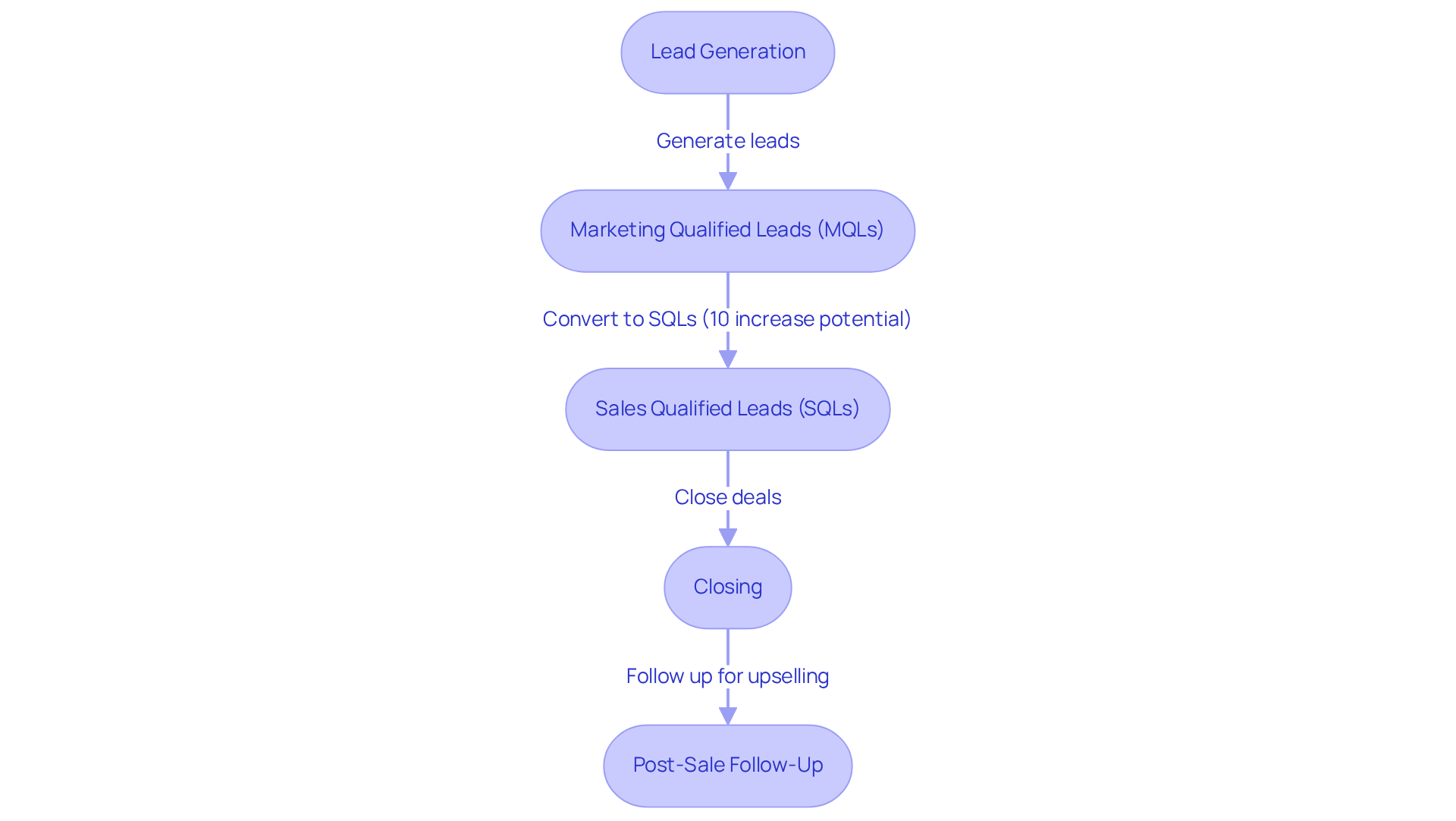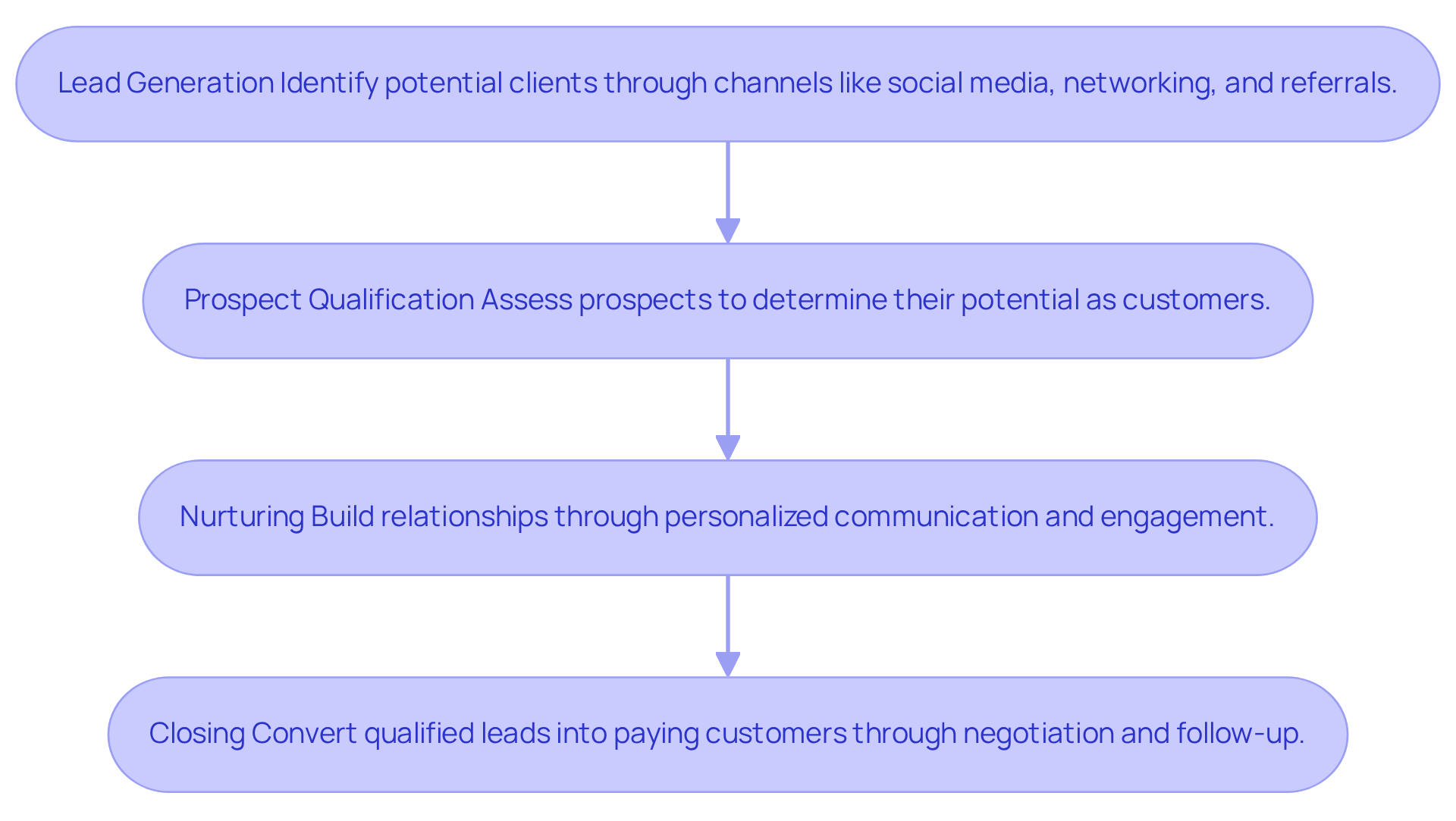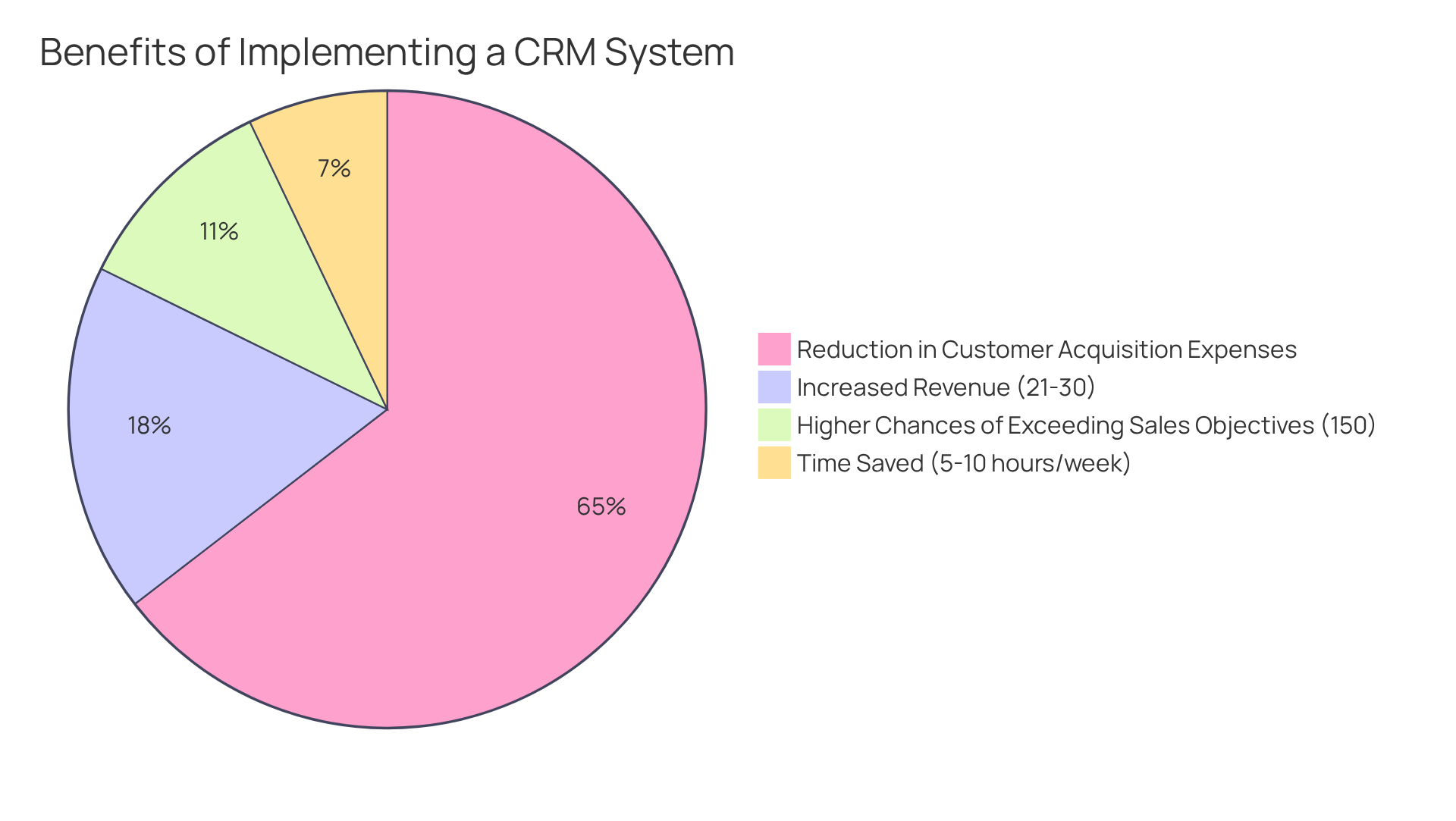Overview
The article highlights the importance of a sales pipeline, a vital tool for small business growth. By systematically managing potential revenue opportunities from lead generation to closing deals, it serves as a roadmap for your success. A well-structured pipeline not only enhances operational efficiency but also improves forecasting accuracy and can significantly increase conversion rates. This ultimately drives sales performance and fosters sustainable growth, addressing the very challenges you may face as a small business owner.
We understand that navigating these complexities can feel overwhelming. However, think of your sales pipeline as a supportive framework that guides you through each stage of the sales process. By implementing this structure, you can gain clarity and confidence in your approach, knowing that you are taking proactive steps towards achieving your goals. Together, we can transform potential opportunities into tangible results.
In conclusion, embracing a sales pipeline is not just about managing leads; it’s about empowering your business to thrive. As you take these steps, remember that you are not alone in this journey. With the right tools and a compassionate approach, you can cultivate a sales strategy that not only meets your needs but also paves the way for lasting success.
Introduction
Understanding the concept of a pipeline is essential for small business owners who wish to streamline their revenue processes and foster growth. A well-defined pipeline not only clarifies the journey from initial contact to final sale but also enhances marketing strategies, ultimately leading to higher conversion rates.
Yet, we understand that many entrepreneurs grapple with the complexities of managing this process effectively. How can you ensure that every lead is maximized and that resources are allocated efficiently?
In this article, we will explore the essential insights surrounding pipelines, offering strategies to overcome common challenges and unlock the full potential of your small business growth. Together, we can navigate this journey toward success.
Define Pipeline: Understanding Its Core Concept
In the journey of expanding your small enterprise, knowing what is pipeline can be a game-changer. What is pipeline? It represents the systematic process of managing potential revenue opportunities, guiding you from that very first contact all the way to final conversion. This journey encompasses every phase of your commercial activities—lead generation, qualification, nurturing, and closing. Visualizing where potential clients stand in the transaction process allows you to monitor progress and identify areas that may need a little extra attention.
By grasping this workflow, you can enhance your marketing efforts and refine your outreach strategies, ultimately boosting your conversion rates. Have you considered implementing lead scoring? This practice helps prioritize high-potential leads, ensuring your efforts are directed towards the most promising opportunities. Additionally, utilizing CRM systems can personalize your approach and illustrate your revenue streams, making management much more efficient.
Did you know that businesses with clearly defined management processes experience revenue growth rates that are 28% faster than those without? Moreover, managing your sales process effectively can lead to an 18% increase in revenue by providing a clear strategy for cultivating leads and closing deals. Regular assessments of your revenue flow are vital for maintaining high sales speed and conversion ratios.
For small business owners seeking budget-friendly solutions, Wayy.ai offers a subscription model at just $99 per month. This service provides daily email insights that track key metrics, such as leads reached, interest shown, and conversion rates. Plus, with a one-click sales strategy guide and focused outreach functions, you can easily see what works each day. Together, we can , making Wayy.ai an invaluable resource on your path to success.

Importance of Pipelines for Small Business Growth
Revenue channels play a vital role in the expansion of small enterprises, offering a structured approach to sales oversight that can truly make a difference. By clearly defining each stage of the sales process, business owners can prioritize their efforts and allocate resources more effectively. Have you ever felt overwhelmed by the complexities of sales? A well-structured process allows companies to quickly identify bottlenecks, empowering them to implement targeted strategies to overcome these challenges.
This proactive approach not only enhances operational efficiency but also improves forecasting accuracy. Imagine being able to predict your revenue streams and adjust your strategies accordingly—this is within reach! Studies show that organizations that effectively manage their revenue channels experience better forecasting precision and improved closing rates. In fact, there’s potential for a 10% increase in conversion rates from Marketing Qualified Leads (MQLs) to Sales Qualified Leads (SQLs).
Ultimately, is essential for boosting sales performance and fostering sustainable long-term growth. It’s not just about numbers; it’s about creating a foundation for success in your small business journey. Together, we can navigate these challenges and achieve the growth you aspire to.

Key Components and Characteristics of Pipelines
The essential elements of an efficient sales process include prospect generation, qualification, nurturing, and closing. Each of these stages is vital for converting leads into loyal clients, and we understand how important this is for your business.
- Lead Generation: This initial stage involves identifying potential clients through diverse channels such as social media, networking events, and referrals. Effective prospect generation strategies are essential for establishing a robust sales foundation, and we know that finding the right clients can feel overwhelming at times.
- Prospect Qualification: Once prospects are generated, they must be assessed to determine their potential as customers. This involves evaluating their needs and readiness to purchase, ensuring that your efforts are focused on the most promising prospects. Remember, it’s about quality over quantity, and we’re here to support you in making those crucial decisions.
- Nurturing: Building relationships through personalized communication and engagement is vital in this stage. Nurturing connections fosters trust and keeps your business prominent, significantly enhancing the likelihood of conversion. It’s essential to monitor revenue flow metrics during this stage to comprehend effectiveness and recognize any obstacles that may occur. Together, we can navigate these challenges and strengthen those relationships.
- Closing: The final stage centers on converting qualified leads into paying customers. This requires effective negotiation and follow-up strategies to seal the deal successfully. Furthermore, comprehending metrics like Customer Acquisition Cost (CAC) and the LTV to CAC ratio can offer valuable insights into the financial well-being of your revenue stream. We believe that can empower you to make informed decisions.
By grasping these elements, along with the distinct attributes of Wayy.ai—such as its capability to track purchase intent signals and automate outreach processes—small enterprise owners can establish a streamlined and effective sales process that optimizes their revenue efforts. With Wayy.ai, users can create over 60 target client connections each month, significantly improving their revenue stream without manual effort. This ultimately drives growth and profitability, and we’re excited to support you on this journey.

Challenges in Managing a Sales Pipeline
Managing a sales pipeline can be quite challenging for small enterprise owners, and we understand what is pipeline and the weight of these responsibilities. One common issue is maintaining accurate data, which can lead to misinformed decisions and missed opportunities. Did you know that 91% of companies report a reduction in customer acquisition expenses after implementing a [CRM system](https://freshworks.com/theworks/company-news/crm-statistics)? This statistic highlights just how crucial precise data management is for your business. Additionally, many small enterprises struggle with a clear approach to resource management, which can result in inefficient use of resources. For instance, A2Go faced difficulties in identifying its target customer profiles, hindering its outreach efforts until Growth Era stepped in to optimize its processes, ultimately revealing a $3.1 million revenue potential.
To effectively address these challenges, implementing a is essential. These systems not only monitor interactions but also automate follow-ups, saving companies an average of 5-10 hours of employee workload each week. Regularly reviewing and refining your understanding of what is pipeline can help uncover areas for improvement. For example, companies that utilize mobile CRM platforms are 150% more likely to exceed their sales objectives, showcasing how these tools can enhance sales performance. Furthermore, the majority of companies experience a revenue increase of 21-30% after adopting a CRM platform, emphasizing the positive impact these systems can have on your bottom line.
By proactively tackling these challenges, small business owners like you can significantly enhance what is pipeline in your management strategy. This leads not only to better sales outcomes but also to increased revenue, paving the way for your business's success.

Conclusion
Understanding the concept of a pipeline is essential for the growth of small businesses, as it provides a structured framework for managing potential revenue opportunities. By effectively navigating the various stages of lead generation, qualification, nurturing, and closing, small business owners can significantly enhance their sales processes and ultimately drive growth.
Throughout this article, we have shared key insights on the importance of having a well-defined pipeline. It’s clear that businesses with clear management processes can experience faster revenue growth and improved conversion rates. The role of CRM systems in streamlining sales efforts and maintaining accurate data has also been emphasized, showing how these tools can lead to more informed decision-making and better resource allocation.
In conclusion, embracing a robust pipeline strategy goes beyond merely improving sales figures; it lays a solid foundation for sustainable business success. We encourage small business owners to invest time in understanding and implementing effective pipeline management practices. By doing so, you can unlock your full potential, navigate challenges more effectively, and foster long-term growth in an ever-evolving marketplace. Together, we can achieve success and create a thriving business environment.
Frequently Asked Questions
What is a pipeline in the context of small business management?
A pipeline represents the systematic process of managing potential revenue opportunities, guiding businesses from the initial contact with leads to final conversion. It encompasses every phase of commercial activities, including lead generation, qualification, nurturing, and closing.
How can visualizing the pipeline benefit a business?
Visualizing where potential clients stand in the transaction process allows businesses to monitor progress and identify areas that may need additional attention, ultimately enhancing marketing efforts and refining outreach strategies.
What is lead scoring, and why is it important?
Lead scoring is a practice that helps prioritize high-potential leads, ensuring that marketing and sales efforts are directed towards the most promising opportunities, which can improve conversion rates.
How do CRM systems contribute to pipeline management?
CRM systems personalize the approach to potential clients and illustrate revenue streams, making the management of sales processes more efficient.
What impact does having a clearly defined management process have on revenue growth?
Businesses with clearly defined management processes experience revenue growth rates that are 28% faster than those without such processes.
What is the potential revenue increase from effectively managing the sales process?
Managing the sales process effectively can lead to an 18% increase in revenue by providing a clear strategy for cultivating leads and closing deals.
Why are regular assessments of revenue flow important?
Regular assessments of revenue flow are vital for maintaining high sales speed and conversion ratios.
What is Wayy.ai, and what services does it offer for small business owners?
Wayy.ai is a subscription service that costs $99 per month, offering daily email insights that track key metrics such as leads reached, interest shown, and conversion rates. It also includes a one-click sales strategy guide and focused outreach functions to enhance sales process management.




